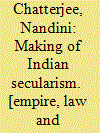|
|
|
Sort Order |
|
|
|
Items / Page
|
|
|
|
|
|
|
| Srl | Item |
| 1 |
ID:
104733


|
|
|
|
|
| Publication |
Hampshire, Palgrave Macmillan, 2011.
|
| Description |
viii, 337p.
|
| Series |
Cambridge imperial and post-colonial studies series
|
| Standard Number |
9780230220058, hbk
|
|
|
|
|
|
|
|
|
|
|
|
Copies: C:1/I:0,R:0,Q:0
Circulation
| Accession# | Call# | Current Location | Status | Policy | Location |
| 056050 | 322.10954/CHA 056050 | Main | On Shelf | General | |
|
|
|
|
| 2 |
ID:
098853


|
|
|
|
|
| Publication |
2010.
|
| Summary/Abstract |
One of the most contentious political issues in postcolonial India is the unfulfilled project of a 'uniform civil code' which would override the existing 'personal laws' or religion-based laws of domestic relations, inheritance and religious institutions. If the personal laws are admitted to be preserved (if somewhat distorted) remnants of 'religious laws', then the legitimacy of state intervention is called into question, especially since the Indian state claims to be secular. This paper, by discussing the history of the lesser-known Christian personal law, demonstrates that this conundrum is of considerable heritage. From the earliest days of British imperial rule in India, the quest to establish a universal body of law conflicted with other legal principles which upheld difference: that of religion, as well as race. It was the historical role of Indian Christians to occasion legal dilemmas regarding the jurisdictions of British and 'native' law, and concurrently about the identity of people subject to those different laws. In trying to discover who the Indian Christians were, and what laws ought to apply to them, British judges had perforce to reflect on who the 'British' were, whilst also dealing with conflicting collective claims made by Hindus, Muslims, Parsis, and Christians themselves about their own identity and religious rights. The Indian Christian personal law was an unintended by-product of this process, a finding which throws light both on the dynamics of colonial legislation, and on the essentially modern nature of Indian personal laws.
|
|
|
|
|
|
|
|
|
|
|
|
|
|
|
|
|
|
|
|
|